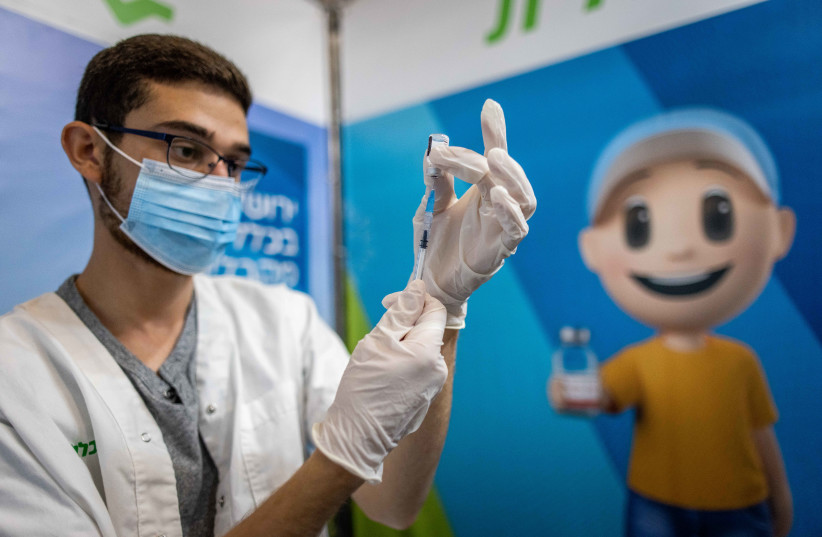In the past few weeks, morbidity in Israel has been constantly decreasing.
As of Monday, the country had 219 serious patients, 7,800 active cases, a positivity rate at 0.68%, a weekly average of 660 new cases per day, around 8-12 daily deaths. In other words, numbers very similar to the ones recorded between the last few days of March and the beginning of April.
At the time, Israel was leaving the third wave – and many thought also the coronavirus at large – behind.
In hindsight, we know that things turned out differently. Around two months later, new outbreaks started in a few Israeli schools and from there COVID soon raged again, with a high number of hospitalizations and deaths.
As the country is leaving the fourth wave behind, one cannot help but wonder if this time the stability will last or on the contrary, the respite will prove once again to be just temporary until what Prime Minister Bennett has sometimes called the “Omega scenario” hits.

“Nobody knows for sure what will happen and I think we need to be very humble,” said Prof. Nadav Davidovitch, an epidemiologist and the director of Ben-Gurion University of the Negev’s School of Public Health. “At the same time, I think there are good chances that this situation is going to last longer, in spite of some challenges.”
The first reason suggested by Davidovitch is related to the efficacy of the Pfizer vaccine booster.
“While we still have to properly check it, it does appear that the booster gives a higher protection against the virus compared to the first two shots, at least based on the first tests conducted in the laboratory,” he said. “This will probably ensure a longer immunity.”
Health authorities and experts agree that one of the crucial factors that allowed such a serious new wave was how the immunity offered by inoculation – which Israel conducted earlier and more rapidly than any other country in the world – dramatically dropped a few months after the second dose.
As a high number of Israelis went on and received their booster – so far some 3.9 million individuals have gotten it - morbidity dropped again.
The hope is that with the third vaccine immunity won’t wane again as rapidly, keeping the virus at bay much longer.
“I believe that the vaccine should have been administered in three doses since the beginning,” said Prof. Dror Mevorach, a senior physician from Hadassah-University Medical Center. “In my opinion, this was necessary to establish a good immune memory.”
For this reason, Mevorach agreed that while there cannot be any certainty, Israel has a good chance to avoid another wave.
Both experts suggested that vaccine efficacy is only one aspect of the country’s strategy to prevent a new surge in morbidity.
“Last time, some restrictions like indoor masks, were dropped too quickly,” said Mevorach.
“I think we are much better prepared now and we have better infrastructures in place,” Davidovitch noted. “We are carrying out more genetic sequencing, more contact tracing and, as long as the numbers are low, we should focus on these aspects, which are manageable in a situation with some hundreds of new cases per day, not when they go up to thousands and thousands.”
At the same time, he stressed that it is going to be important to take advantage of the low morbidity to strengthen the health system in Israel and the global cooperation in the field of health to face what the future might bring.
When, in May, the US Food and Drug Administration granted authorization to vaccinate children ages 12-15, Israel took a few weeks before green-lighting the inoculation and then only recommended jabs for individuals with high risk factors or who intended to travel abroad.
A few weeks later, the new outbreaks started in that cohort and when the authorities began to push the vaccination drive more vigorously, the wave was already raging, with a high percentage of infected registered in that age group.
Asked about whether something similar could happen with the cohort 5-11 – a discussion of the Health Ministry’s advisory body on the topic is scheduled for Thursday – the experts did not appear to be concerned.
“We are going to have the discussion, the data seems good, but I’m not concerned that we are going to need to push families to vaccinate their children,” Davidovitch said. “Surveys have suggested that most parents are eager to inoculate and protect their children.”
“Even if we decided to wait a few weeks so we have more data about how the vaccination campaign goes in the US, I don’t think it would be a bad choice,” Mevorach noted. “But I would definitely not wait for another wave to begin the drive.”
The physician stressed that it is going to be important to continue to monitor the airport to prevent new variants from entering the country.
According to Davidovitch, the lack of equality in vaccine distribution around the world, represents one of the worst threats to Israel’s good situation.
“I think that my main concern is that vaccination rates on the global scale is still very low,” he said. “This is a fertile ground for developing new variants and there is a chance that a new variant will develop which spreads even faster than Delta.”
